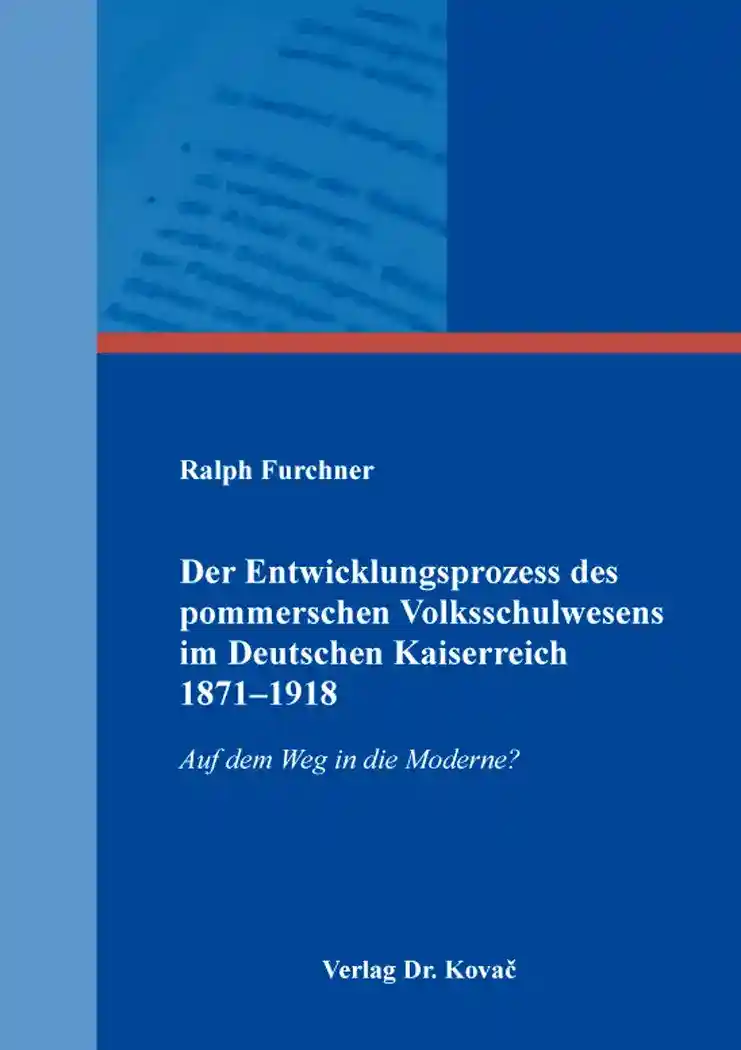Ralph FurchnerDer Entwicklungsprozess des pommerschen Volksschulwesens im Deutschen Kaiserreich 1871–1918
Auf dem Weg in die Moderne?
EUB. Erziehung – Unterricht – Bildung, volume 200
Hamburg 2021, 366 pages
ISBN 978-3-339-12606-1 (print) |ISBN 978-3-339-12607-8 (eBook)
Rezension
[...] Insgesamt besticht die Studie durch Detailreichtum, Stringenz und Übersichtlichkeit. [...]
Zusammenfassend bündelt Furchner seine Ergebnisse übersichtlich, indem er die Modernisierungserfolge den weiter bestehenden defensiven Grundzügen vor allem in den ländlichen Gebieten gegenüberstellt. [...]
Abschließend führt Furchner weitergehende Forschungsfragen an, womit er die Brücke schlägt zu aktuellen Herausforderungen – etwa den Mangel an Lehrkräften im ländlichen Raum.
About this book deutschenglish
In the German Empire, the elementary school was the dominant educational institution for most of the population. In the early 20th century, around 90% of all schoolchildren in Prussia attended an elementary school. The middle schools and especially the higher schools, on the other hand, retained their exclusive status and were in any case difficult to reach for the rural population. Thus, for many pupils, there was no getting around the elementary school.
While there has been a wealth of knowledge about the primary school system at the national level for some time, the scientific processing at the regional level followed with a delay and continues to reveal blind spots. The present work starts here and fits into the series of educational history works that examine the Prussian elementary school system with a temporal and regional delimitation.
The period chosen was accompanied by extensive processes of transformation in economic, political, social and cultural terms, while the influence of the traditional power elites was retained. This juxtaposition and sometimes interlocking of progressive and traditional features also shaped the Pomeranian primary school system. For example, the primary school teachers experienced a slow but steady improvement in their economic situation and still had to submit to religious school supervision and traditional conventions, especially in rural areas. In particular, political activity in a party or a teachers’ association was not infrequently answered with disciplinary measures up to and including impeachment. In order to investigate this tension, this book presents essential parts of the Pomeranian school landscape, including rural and urban elementary schools, teacher training and the measures taken by teachers to raise their social status. The development of nationalistic tendencies and the effects of World War I on everyday school life are also explained.
Keywords
1. WeltkriegDeutsches KaiserreichErziehungswissenschaftGeschichtswissenschaftLehrerbildungLehrervereinModernisierungPommernPreußenProfessionalisierungProvinzSchulpädagogikSeminarVerberuflichungVolksschuleIhr Werk im Verlag Dr. Kovač

Möchten Sie Ihre wissenschaftliche Arbeit publizieren? Erfahren Sie mehr über unsere günstigen Konditionen und unseren Service für Autorinnen und Autoren.
